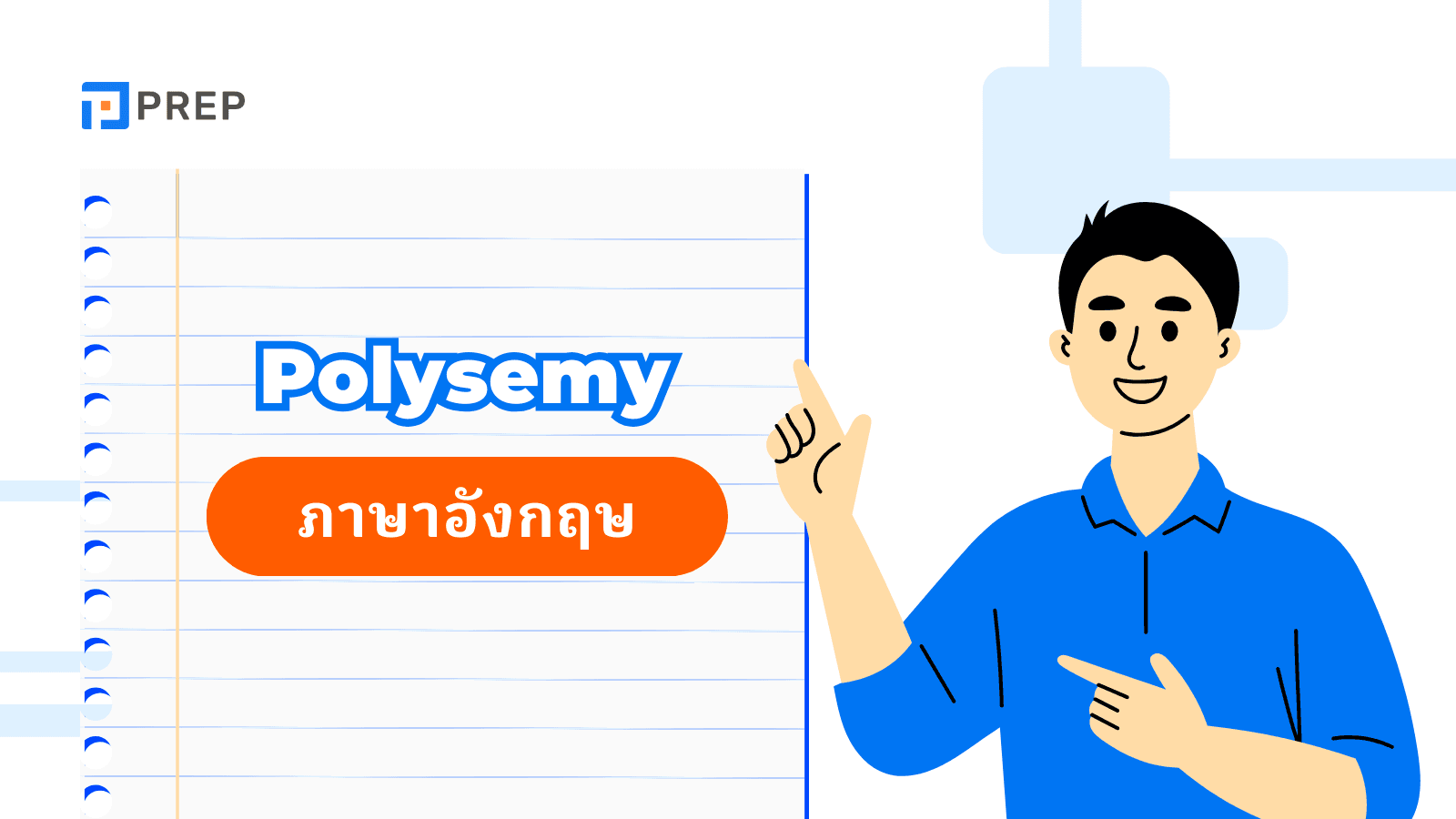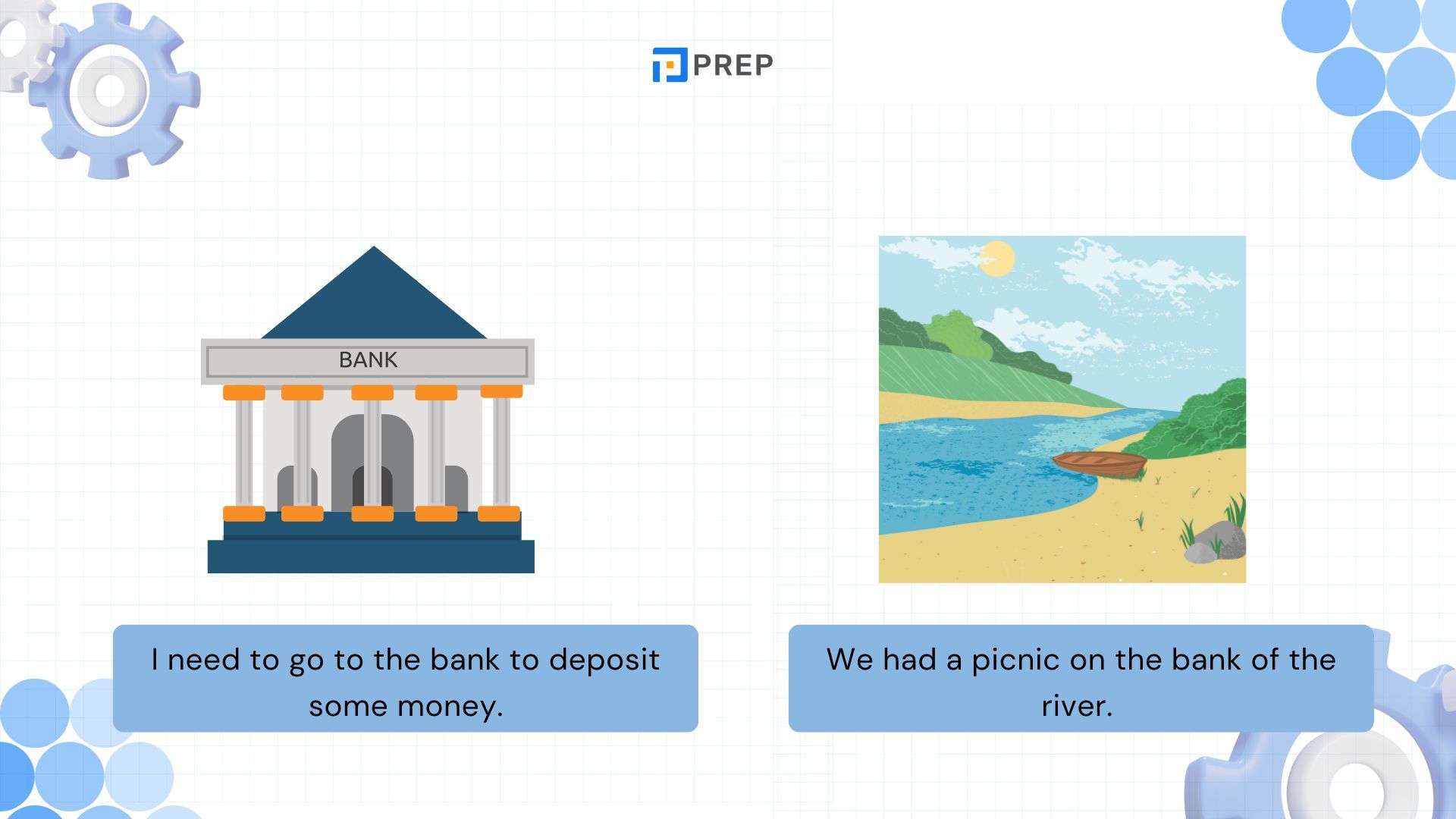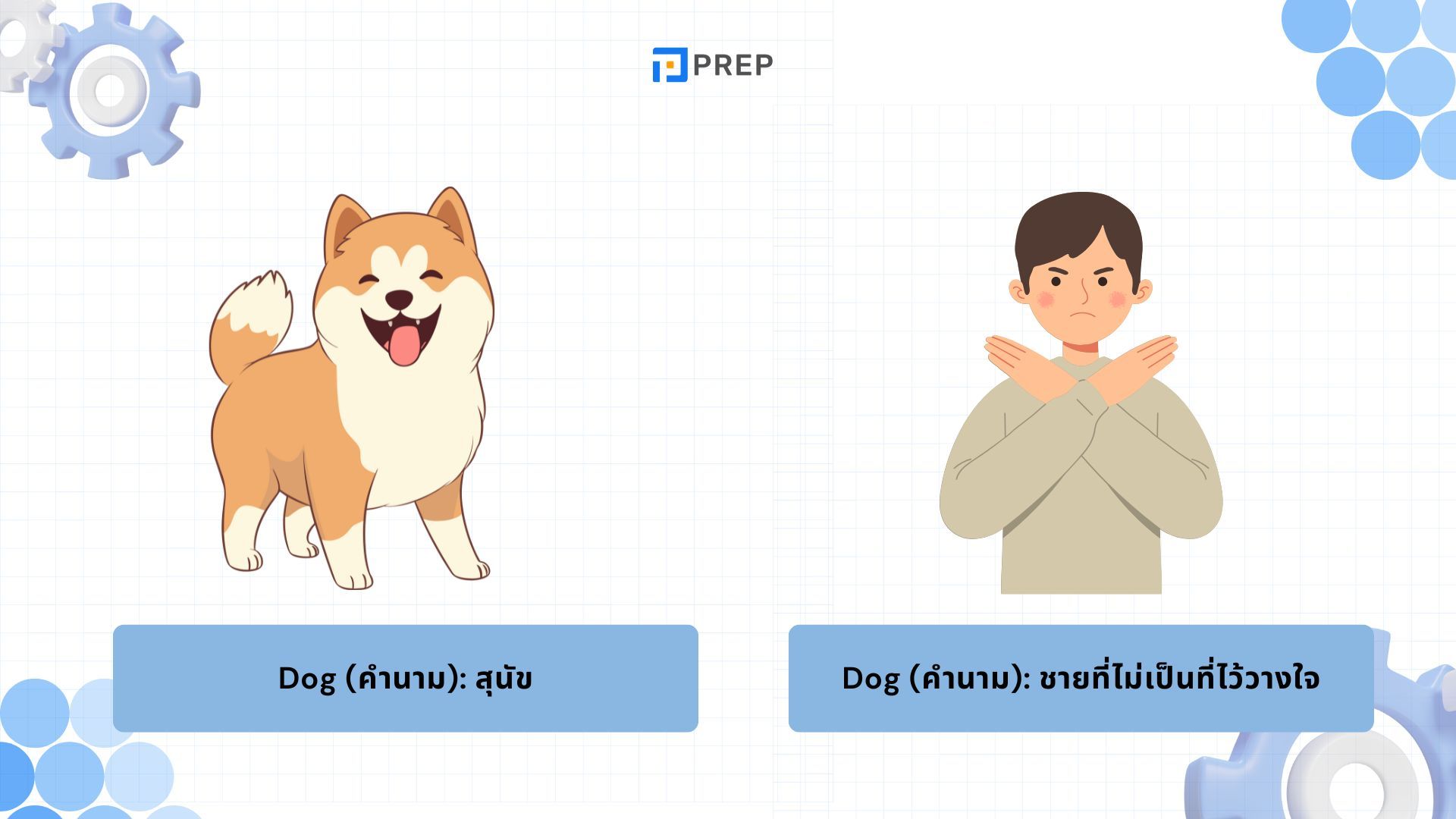Polysemy คือ? คำเดียวแต่ความหมายไม่เดียว
Polysemy คือ (ภาวะหลายความหมาย) ปรากฏการณ์ทางภาษาที่คำๆ หนึ่งมีความหมายหลายอย่างที่เกี่ยวข้องกัน การเข้าใจคำหลายความหมาย จะช่วยให้คุณเข้าใจบริบทและใช้ภาษาอังกฤษได้อย่างแม่นยำ บทความนี้จะอธิบาย Polysemy คือ อะไร ความแตกต่างจาก Homonymy พร้อมตัวอย่างและวิธีการเรียนรู้อย่างมีประสิทธิภาพ

I. Polysemy คือ อะไร?
ความหมายและนิยาม
Polysemy คือปรากฏการณ์ที่คำๆ หนึ่งมีความหมายหลายอย่างที่มีความเกี่ยวข้องหรือเชื่อมโยงกัน
คำว่า Polysemy มาจาก:
-
Poly = หลาย (many)
-
Semy = ความหมาย (meaning)
-
รวมแล้วหมายถึง "หลายความหมาย"
ลักษณะสำคัญของ Polysemy
|
ลักษณะ |
คำอธิบาย |
|
คำเดียวกัน |
ใช้คำเดียวกันทุกความหมาย |
|
ความหมายเกี่ยวข้อง |
ความหมายแต่ละอย่างมีความเชื่อมโยงกัน |
|
พัฒนาจากต้นกำเนิดเดียวกัน |
ความหมายทั้งหมดมาจากรากศัพท์เดียวกัน |
|
ขึ้นกับบริบท |
ความหมายชัดเจนเมื่อดูจากประโยค |
II. ความแตกต่างระหว่าง Polysemy และ Homonymy
Polysemy คือแนวคิดที่ต่างจาก Homonymy:
|
Polysemy |
Homonymy |
|
|
ความหมาย |
คำมีหลายความหมายที่เกี่ยวข้องกัน |
คำเหมือนกันแต่ความหมายไม่เกี่ยวข้อง |
|
ต้นกำเนิด |
มาจากรากศัพท์เดียวกัน |
มาจากรากศัพท์ต่างกัน |
|
ความเชื่อมโยง |
มีความเชื่อมโยงเชิงแนวคิด |
ไม่มีความเชื่อมโยง |
|
ตัวอย่าง |
book (หนังสือ/จอง) |
bank (ธนาคาร/ตลิ่ง) |
ตัวอย่างเปรียบเทียบ
Polysemy:
-
Head (หัว): ส่วนของร่างกาย → หัวหน้า → ส่วนบน (เกี่ยวข้องกัน)
Homonymy:
-
Bat (ค้างคาว/ไม้เบสบอล): ไม่มีความเกี่ยวข้องกัน มาจากรากศัพท์คนละที่
III. ประเภทของ Polysemy
Polysemy คือปรากฏการณ์ที่แบ่งออกเป็นหลายประเภท:
1. Linear Polysemy (การขยายความหมายเชิงเส้น)
ความหมายพัฒนาจากความหมายดั้งเดิมไปสู่ความหมายใหม่ทีละขั้น
ตัวอย่าง: Mouth
-
ปาก (ของคน/สัตว์)
-
ปากถ้ำ
-
ปากแม่น้ำ
-
ช่องเปิด
2. Metaphorical Polysemy (การขยายความหมายเชิงอุปมา)
ใช้คำในความหมายเปรียบเทียบ
ตัวอย่าง: Bright
-
สว่าง (แสง)
-
ฉลาด (บุคคล)
-
สดใส (สี)
-
ร่าเริง (บุคลิก)
3. Functional Polysemy (การขยายความหมายเชิงหน้าที่)
ความหมายขยายตามหน้าที่การใช้งาน
ตัวอย่าง: Paper
-
กระดาษ (วัสดุ)
-
หนังสือพิมพ์
-
เอกสาร
-
รายงาน/เรียงความ

IV. Polysemy ในหมวดหมู่ต่างๆ
Polysemy คือ ปรากฏการณ์ที่พบได้ในหลายหมวด:
1. ส่วนของร่างกาย
|
คำ |
ความหมายดั้งเดิม |
ความหมายขยาย |
|
Head |
หัว |
หัวหน้า, ส่วนบน |
|
Hand |
มือ |
ให้, ช่วยเหลือ, เข็มนาฬิกา |
|
Face |
หน้า |
เผชิญหน้า, ด้าน |
|
Eye |
ตา |
รู, จุดศูนย์กลาง |
|
Heart |
หัวใจ |
ใจกลาง, สาระสำคัญ |
2. สิ่งของและอุปกรณ์
|
คำ |
ความหมายหลัก |
ความหมายเพิ่มเติม |
|
Glass |
แก้ว (วัสดุ) |
แก้วน้ำ, แว่นตา, กระจก |
|
Chair |
เก้าอี้ |
ประธาน, ตำแหน่ง |
|
Table |
โต๊ะ |
ตาราง, เลื่อนการพิจารณา |
|
Key |
กุญแจ |
คีย์บอร์ด, กุญแจสำคัญ, คีย์เพลง |
3. คำกริยาการเคลื่อนที่
|
คำ |
ความหมายพื้นฐาน |
ความหมายขยาย |
|
Go |
ไป |
จากไป, ทำงาน, เสีย |
|
Come |
มา |
มาถึง, เกิดขึ้น |
|
Move |
เคลื่อนที่ |
ย้าย, สะเทือนใจ, เดินหมาก |
|
Turn |
หมุน |
เลี้ยว, กลายเป็น, ผลัด |
4. คำคุณศัพท์
|
คำ |
ความหมายต่างๆ |
|
Cold |
เย็น, หนาว, ไม่เป็นมิตร, โรคหวัด |
|
Hot |
ร้อน, เผ็ด, โมโห, ฮิต |
|
Sharp |
คม, ฉลาด, เฉียบพลัน, แหลม |
|
Soft |
นุ่ม, เบา, อ่อนโยน |
V. ข้อสังเกตสำคัญเมื่อเรียน Polysemy ภาษาอังกฤษ
เมื่อเรียนรู้ polysemy ภาษาอังกฤษ มีประเด็นสำคัญบางประการที่คุณควรเข้าใจเพื่อช่วยให้คุณเรียนรู้ได้อย่างมีประสิทธิภาพและหลีกเลี่ยงความสับสน:
-
เข้าใจบริบท: บริบทมีความสำคัญมากในการตัดสินความหมายของ Polysemy ให้ความสนใจกับคำที่อยู่รอบ ๆ และสถานการณ์ที่ใช้คำนั้นเพื่อเข้าใจความหมายเฉพาะ ตัวอย่างเช่น:
-
I saw Anna and talked to her for an hour yesterday. (เมื่อวานฉันเจอ Anna และคุยกับเธอประมาณชั่วโมงหนึ่ง)
-
I see what John is talking about. (ฉันเห็นว่า John กำลังพูดถึงอะไร)
-
-
เรียนรู้ความหมายที่ใช้บ่อยก่อน: เริ่มจากการเรียนรู้ความหมายที่พบได้บ่อยที่สุดของคำ จากนั้นขยายไปสู่ความหมายที่ไม่ค่อยใช้ ตัวอย่างเช่น:
-
Dog /dɑːɡ/ (คำนาม): สุนัขคือสัตว์เลี้ยงทั่วไปที่มีสี่ขา
-
Dog /dɑːɡ/ (คำนาม): ชายที่ไม่เป็นที่ไว้วางใจ
-
Dog /dɑːɡ/ (กริยา): ติดตามใครอย่างใกล้ชิดและต่อเนื่อง
-

-
ใช้ประโยคตัวอย่าง: สร้างหรือหาประโยคตัวอย่างที่อธิบายความหมายของแต่ละคำ วิธีนี้ช่วยให้คุณจำคำในบริบทที่เฉพาะเจาะจงและแยกความหมายต่าง ๆ ได้ง่าย ตัวอย่างเช่น:
-
Dish /dɪʃ/ (คำนาม): จาน เช่น: I hold an ovenproof dish. (ฉันถือจานที่เข้าเตาอบได้)
-
Dish /dɪʃ/ (คำนาม): คนที่ดึงดูดทางเพศ เช่น: He's gorgeous - what a dish! (เขาหล่อมากเลย)
-
Dish /dɪʃ/ (กริยา): ส่งบอลในกีฬา เช่น: She can improve at dishing the ball, making decisions, and shooting from midrange. (เธอสามารถปรับปรุงการจ่ายบอล การตัดสินใจ และการยิงจากระยะกลางได้)
-
-
จดบันทึกและทบทวน: เขียนคำ Polysemy และความหมายต่าง ๆ ลงในสมุดบันทึกหรือแอปคำศัพท์ แล้วทบทวนเป็นประจำเพื่อเสริมสร้างความจำ
-
ใช้แผนที่ความคิด (Mind Maps): ใช้แผนที่ความคิดในการเรียนรู้ Polysemy ภาษาอังกฤษ โดยวางคำหลักไว้ตรงกลาง และล้อมรอบด้วยคำที่เกี่ยวข้อง
-
ใช้พจนานุกรมเฉพาะในการค้นหา Polysemy: พจนานุกรมภาษาอังกฤษ เช่น Merriam-Webster, Oxford, และ Cambridge ให้คำอธิบายรายละเอียดเกี่ยวกับความหมายต่าง ๆ ของคำ
บทความที่แนะนำ:
Synonym คืออะไร? เจาะลึกคำพ้องความหมาย
คำตรงข้าม ภาษาอังกฤษ รู้ไว้ใช้ได้จริง
Metaphor คืออะไร? ความหมาย ตัวอย่าง และวิธีใช้เข้าใจง่าย
VI. แบบฝึกหัดการใช้ Polysemy ภาษาอังกฤษ
เพื่อช่วยให้คุณเข้าใจการใช้ Polysemy ภาษาอังกฤษได้ดีขึ้น มาทำแบบฝึกหัดด้านล่างด้วยกันดีกว่า!
1. แบบฝึกหัด : เติมคำศัพท์ให้เหมาะสม
|
bark, match, rock, spring, lead |
-
The tree's _____ is very rough.
-
She decided to _____ a fire using some dry wood.
-
The concert was amazing, especially the _____ band.
-
The _______ water was crystal clear and refreshing.
-
They need to find a perfect _____ for the new job position.
-
During the hike, he stumbled over a large _____.
-
The dog's loud _____ woke up the entire neighborhood.
-
He took the _____ role in the school play.
-
She has a natural ability to _____ a team effectively.
-
The flowers start to bloom in the _____.
2. เฉลย
|
|
Polysemy คือ ปรากฏการณ์ทางภาษาที่คำๆ หนึ่งมีหลายความหมายที่เกี่ยวข้องกัน แตกต่างจาก Homonymy ที่มีความหมายไม่เกี่ยวข้องกัน ภาวะหลายความหมาย เกิดจากการพัฒนาและขยายความหมายของคำจากรากศัพท์เดียวกัน มีหลายประเภทเช่น Linear Polysemy, Metaphorical Polysemy และ Functional Polysemy
คำหลายความหมาย ที่พบบ่อยในภาษาอังกฤษเช่น book (หนังสือ/จอง), run (วิ่ง/บริหาร/ทำงาน), head (หัว/หัวหน้า), light (แสง/เบา/จุด) และ time (เวลา/ครั้ง/ยุค) การเข้าใจ Polysemy คือ อะไรช่วยพัฒนาทักษะการอ่าน การเขียน และการพูดภาษาอังกฤษ โดยเฉพาะในการสอบ IELTS ที่ต้องเข้าใจบริบทและความหมายของคำในสถานการณ์ต่างๆ
วิธีเรียนรู้ Polysemy คือ การเรียนรู้ในบริบท สังเกตความเชื่อมโยงระหว่างความหมาย ใช้ Mind Map และฝึกผ่านการอ่านบทความจริง ควรแยกให้ออกจาก Homonymy (คำเขียนเหมือนกันแต่ไม่เกี่ยวข้อง), Homograph (เขียนเหมือนออกเสียงต่าง) และ Homophone (ออกเสียงเหมือนเขียนต่าง) การเข้าใจ Polysemy คือ กุญแจสำคัญในการเรียนรู้ภาษาอังกฤษอย่างลึกซึ้งและใช้ได้อย่างแม่นยำในทุกสถานการณ์
PREP Edu มอบ PREP IELTS ที่ครอบคลุมการพัฒนาทักษะคำศัพท์และความเข้าใจในการใช้ภาษาอย่างเป็นระบบ ด้วยหลักสูตรที่แบ่งระดับตั้งแต่พื้นฐานจนถึงขั้นสูง ผู้เรียนจะได้รับการฝึกฝนผ่านบทเรียนที่มีโครงสร้างชัดเจนและครอบคลุมคำศัพท์สำคัญพร้อมบริบทการใช้งานที่หลากหลาย เทคโนโลยี AI ช่วยประเมินและให้คำแนะนำแบบเฉพาะบุคคล ขณะที่ Virtual Speaking Room และ Virtual Writing Room ช่วยฝึกฝนทักษะพร้อมรับคำติชมทันทีตามเกณฑ์มาตรฐาน IELTS ทีมผู้สอนมืออาชีพพร้อมสนับสนุนเพื่อให้ผู้เรียนบรรลุเป้าหมายคะแนนที่ตั้งใจไว้อย่างมีประสิทธิภาพ

สวัสดีค่ะ ฉันชื่อมุก ปัจจุบันดูแลด้านเนื้อหาผลิตภัณฑ์ของ Prep Education ค่ะ
ด้วยประสบการณ์มากกว่า 5 ปีในการเรียน IELTS ออนไลน์ด้วยตนเอง ฉันเข้าใจดีถึงความท้าทายที่ผู้เรียนต้องเผชิญ แล้วก็รู้ว่าอะไรที่มันเวิร์ก
มุกอยากเอาประสบการณ์ตรงนี้มาช่วยแชร์ แล้วก็ซัพพอร์ตเพื่อน ๆ ให้ได้คะแนนที่ดีที่สุดค่ะ
ความคิดเห็น
เนื้อหาแบบพรีเมียม
ดูทั้งหมดแผนการเรียนรู้ส่วนบุคคล
อ่านมากที่สุด
ติดต่อ Prep ผ่านโซเชียล
















